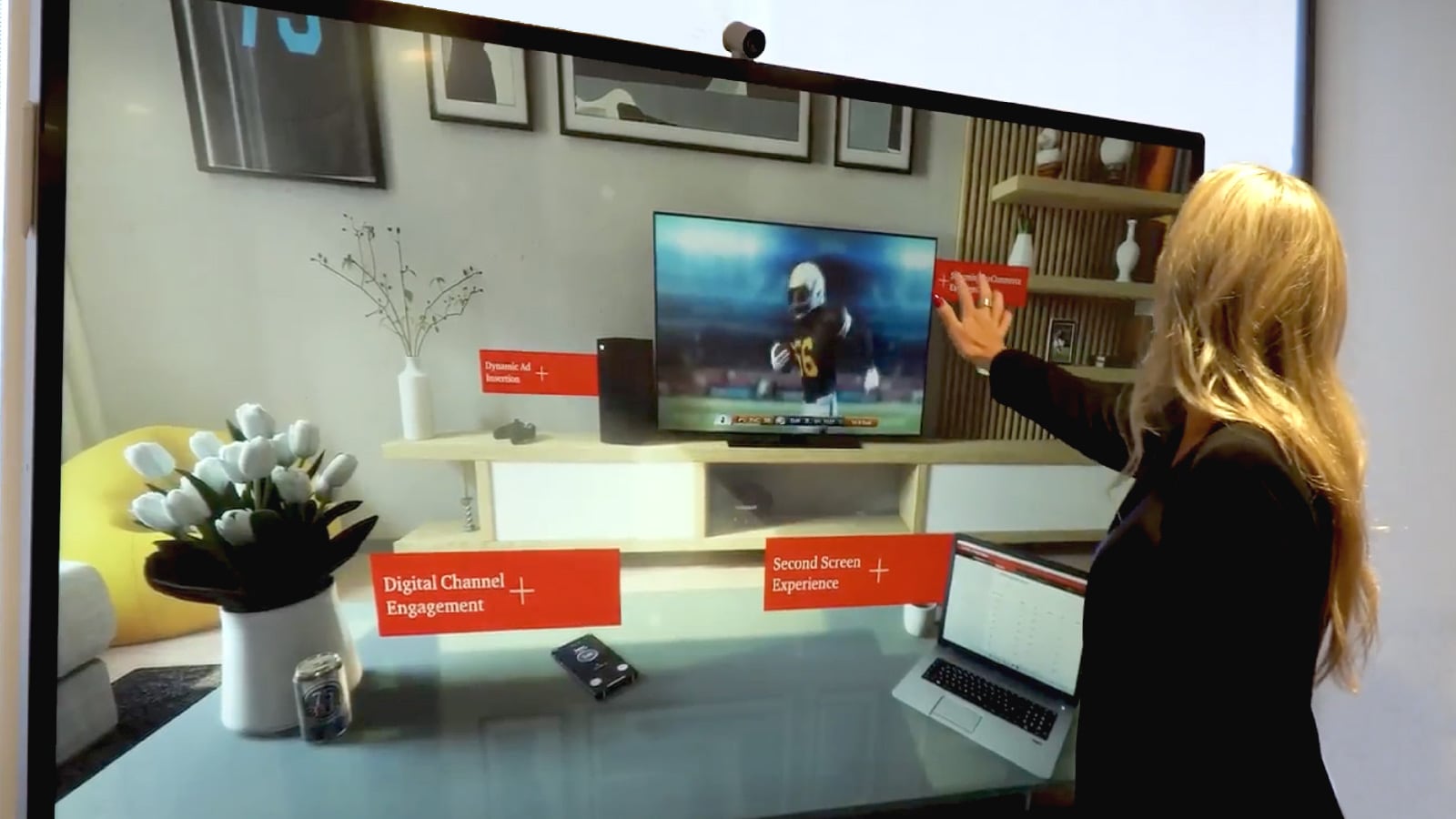Playing to win
with data
On and off the field: Three ways PwC and Microsoft transform experiences with cloud, AI and mixed reality


The partnership between PwC and Microsoft is helping pro football players, teams and venues raise their game – but the impact of advanced technology extends far beyond the gridiron.

Every snap in a pro football game is like a chess match. Crafting and executing a game plan combines speed, power and calculated strategy built on analysis and prediction. So it’s no surprise that teams have embraced data and technology to help them gain an edge wherever they can.
Football fans may have seen some of this technology in action: coaches using Microsoft Surface tablets on the sidelines to keep tabs on in-game results and player health, broadcasters rattling off advanced performance metrics. Now PwC and Microsoft are collaborating to unleash a whole suite of transformative technology built on Microsoft Azure and Microsoft Dynamics 365, at all levels of the game.
These innovative new ways to harness data offer profound applications far beyond football. Your business may not deal in seven-step drops, but mastering agility, risk management and informed decision-making is critical for a smart strategy, no matter the field of play.
Explore how these data-powered use cases can transform your teams, facilities and customer experiences.
Give your team a competitive edge
Success comes from putting your team in the best possible position to do its job. Whether it’s developing and refining a strategy, modeling outcomes or simplifying day-to-day tasks, an organization’s data equips employees for peak performance — if properly harnessed. The same technology used by pro teams and players can power people throughout the enterprise.
Today’s pro athletes train using sophisticated technology unthinkable just a decade ago. Augmented and mixed reality create a realistic, contact-free practice environment that can simulate a variety of outcomes for individual plays while reducing the likelihood of injury.
This is brought to life leveraging Microsoft technology such as the HoloLens. Using Microsoft Azure Kinect’s technology, AI-based sensors monitor real-time, on-field body metrics, physical demands and sustained versus peak performance.
By analyzing the resulting data, coaches and leaders gain insight into top performers and ways to gain a competitive edge. Teams can better project injury risks, the results of a play against particular defenders and even the likelihood of a draft prospect panning out.
Similar technology can power a host of measurable benefits for today’s businesses. Research proves that AR and VR can help staff learn and practice new skills — including “soft” skills like leadership, resilience and change management — in realistic, controlled and safe environments while simplifying and automating outdated processes.
Business leaders can leverage the resulting data to provide their teams with smarter insights, improve performance and better contextualize results. And technologies like AI and digital twins enable companies to predict market opportunities, model outcomes and forecast the impact of strategic decisions.
Today’s pro athletes train using sophisticated technology unthinkable just a decade ago. Augmented and mixed reality create a realistic, contact-free practice environment that can simulate a variety of outcomes for individual plays while reducing the likelihood of injury.
This is brought to life leveraging Microsoft technology such as the HoloLens. Using Microsoft Azure Kinect’s technology, AI-based sensors monitor real-time, on-field body metrics, physical demands and sustained versus peak performance.
By analyzing the resulting data, coaches and leaders gain insight into top performers and ways to gain a competitive edge. Teams can better project injury risks, the results of a play against particular defenders and even the likelihood of a draft prospect panning out.
Similar technology can power a host of measurable benefits for today’s businesses. Research proves that AR and VR can help staff learn and practice new skills — including “soft” skills like leadership, resilience and change management — in realistic, controlled and safe environments while simplifying and automating outdated processes.
Business leaders can leverage the resulting data to provide their teams with smarter insights, improve performance and better contextualize results. And technologies like AI and digital twins enable companies to predict market opportunities, model outcomes and forecast the impact of strategic decisions.

Watch how data powers player analytics
Duration: 00:00:46
Work smarter with tech-powered facilities
Nothing puts a damper on game day like struggling to find a parking spot or waiting to enter the stadium. Smart technology can capture on-premises data on customer interactions that until now went untracked. By analyzing this information, facility managers can make logistical improvements and deliver a better customer experience. Today's smart stadiums pack sophisticated cloud technology into everything from parking to concession lines to restroom maintenance — but you don’t need to seat 70,000 to transform your approach to facilities management.
From the moment a fan decides to attend a game, data and technology play a major role in delivering a better fan experience. This new game day experience is being transformed with Microsoft technologies like Dynamics 365, Azure Analytics and Cognitive Services. Smart venues are streamlining operations and building trust by leveraging actionable insights to enhance contactless payments, paperless ticketing and spectator health checks at entrances.
Once inside the building, smart stadiums can offer fans real-time info on the shortest concession or restroom lines, where to find open parking spaces and even how to upgrade their seats.
These venues increase efficiency and lower costs by monitoring, predicting and managing equipment status, waste removal and climate control.
Technology including digital twins, IoT sensors and AI can promote a more modern, more rewarding experience for everyone entering a facility. These technologies create a safer, healthier environment for both customers and staff by removing barriers and helping people get where they need to go faster.
Behind the scenes, you can realize operational efficiencies and decreased costs thanks to centralized core functions, smarter resource planning and predictive analytics.
From the moment a fan decides to attend a game, data and technology play a major role in delivering a better fan experience. This new game day experience is being transformed with Microsoft technologies like Dynamics 365, Azure Analytics and Cognitive Services. Smart venues are streamlining operations and building trust by leveraging actionable insights to enhance contactless payments, paperless ticketing and spectator health checks at entrances.
Once inside the building, smart stadiums can offer fans real-time info on the shortest concession or restroom lines, where to find open parking spaces and even how to upgrade their seats.
These venues increase efficiency and lower costs by monitoring, predicting and managing equipment status, waste removal and climate control.
Technology including digital twins, IoT sensors and AI can promote a more modern, more rewarding experience for everyone entering a facility. These technologies create a safer, healthier environment for both customers and staff by removing barriers and helping people get where they need to go faster.
Behind the scenes, you can realize operational efficiencies and decreased costs thanks to centralized core functions, smarter resource planning and predictive analytics.

Tour a smart stadium
Duration: 00:00:54
Convert customers into loyal fans
Harnessing data is essential to meeting and exceeding customer demand for an experience that extends beyond their basic wants and needs. For football fans, this means creating additional touchpoints that complement the live game, no matter what screen(s) they’re watching on. The cross-industry possibilities for personalization, engagement and monetization are equally exciting. By understanding demand signals and engaging customers with relevant, resonant offers and content, businesses can build deep relationships and foster loyalty that lasts.
For many football fans, watching the game itself is only half the fun, thanks to second-screen experiences that supplement the action on the field. Fans can virtually huddle live with their team before the game and attend exclusive virtual events after. Live data feeds of player and league stats give more meaning and context to on-field results.
Even advertisements become less distracting and more resonant with dynamically inserted, personalized ads, offers and notifications based on viewer preferences. These targeted, tailored omnichannel experiences encourage viewers to become customers, and customers to become fans. When they’re ready to shop, they can simply tap the screen to purchase their favorite player’s jersey.
No matter the field of play, conversion is the name of the game. Using transactional, behavioral and real-time data, businesses can offer timely touchpoints to deepen the customer journey and extend digital experiences beyond the event. Create new channels for engagement that meet customers where they are and supercharge your CRM-based sales with highly relevant offers based on customer preferences and interests.
For many football fans, watching the game itself is only half the fun, thanks to second-screen experiences that supplement the action on the field. Fans can virtually huddle live with their team before the game and attend exclusive virtual events after. Live data feeds of player and league stats give more meaning and context to on-field results.
Even advertisements become less distracting and more resonant with dynamically inserted, personalized ads, offers and notifications based on viewer preferences. These targeted, tailored omnichannel experiences encourage viewers to become customers, and customers to become fans. When they’re ready to shop, they can simply tap the screen to purchase their favorite player’s jersey.
No matter the field of play, conversion is the name of the game. Using transactional, behavioral and real-time data, businesses can offer timely touchpoints to deepen the customer journey and extend digital experiences beyond the event. Create new channels for engagement that meet customers where they are and supercharge your CRM-based sales with highly relevant offers based on customer preferences and interests.

Look inside a connected customer journey
Duration: 00:00:52

Webinar:
Win on and off the field with data
Hear from former professional football player, Israel Idonjie, on ways data and immersive technology are changing the game. Microsoft and PwC will share how data drives experience and is the connective tissue for brands and the customers they serve.
US and Global Head of PwC’s Cloud, Engineering, Data, and AI, PwC US
Advisory AI Leader, PwC US









